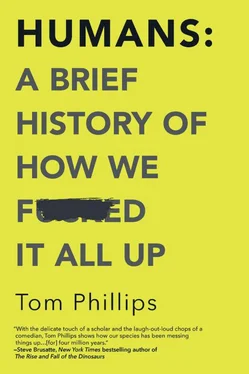Tom Phillips - Humans - A Brief History of How We F*cked It All Up
Здесь есть возможность читать онлайн «Tom Phillips - Humans - A Brief History of How We F*cked It All Up» весь текст электронной книги совершенно бесплатно (целиком полную версию без сокращений). В некоторых случаях можно слушать аудио, скачать через торрент в формате fb2 и присутствует краткое содержание. Город: Toronto, Год выпуска: 2019, ISBN: 2019, Издательство: Hanover Square Press, Жанр: История, Юмористические книги, на английском языке. Описание произведения, (предисловие) а так же отзывы посетителей доступны на портале библиотеки ЛибКат.
- Название:Humans: A Brief History of How We F*cked It All Up
- Автор:
- Издательство:Hanover Square Press
- Жанр:
- Год:2019
- Город:Toronto
- ISBN:978-1-48805-113-5
- Рейтинг книги:4 / 5. Голосов: 1
-
Избранное:Добавить в избранное
- Отзывы:
-
Ваша оценка:
- 80
- 1
- 2
- 3
- 4
- 5
Humans: A Brief History of How We F*cked It All Up: краткое содержание, описание и аннотация
Предлагаем к чтению аннотацию, описание, краткое содержание или предисловие (зависит от того, что написал сам автор книги «Humans: A Brief History of How We F*cked It All Up»). Если вы не нашли необходимую информацию о книге — напишите в комментариях, мы постараемся отыскать её.
Humans: A Brief History of How We F*cked It All Up — читать онлайн бесплатно полную книгу (весь текст) целиком
Ниже представлен текст книги, разбитый по страницам. Система сохранения места последней прочитанной страницы, позволяет с удобством читать онлайн бесплатно книгу «Humans: A Brief History of How We F*cked It All Up», без необходимости каждый раз заново искать на чём Вы остановились. Поставьте закладку, и сможете в любой момент перейти на страницу, на которой закончили чтение.
Интервал:
Закладка:
As pest control in Delhi, the British government offered a bounty for dead cobras. So people simply bred cobras to claim the bounty. So the British dropped the bounty. So people turned the worthless cobras loose. Result: more cobras.
As the Great Depression started to bite in 1930, the US introduced large tariffs on imports to try and prop up domestic industries. Instead, the resulting trade war only worsened the global depression.
In Quebec in the 1940s and 1950s, the government offered church groups subsidies to care for both orphans and the mentally ill. But the psychiatric payments were double that for orphans—so thousands of orphans were falsely diagnosed as mentally ill.
In 1989, Mexico City tried to reduce air pollution by banning particular cars from being driven on certain days. Unfortunately, rather than taking the bus, people just bought more cars so they’d always have one that was legal to drive.
6
War. Huh. What Is It Good For?
Humans are very keen on war. It is, in many ways, our “thing.” The oldest evidence in the archaeological record for organized mass violence dates back to around 14,000 years ago, at Jebel Sahaba in the Nile Valley, although let’s be honest, we’ve probably been having fights of some kind a lot longer. Meanwhile (as mentioned a couple of chapters ago), evidence from Oaxaca in Mexico suggests that pretty much as soon as people started living in villages, one village would try to raid another, and things would quickly escalate from there.
It’s estimated that between 90 and 95 percent of all known societies have engaged in war on a fairly regular basis; the few that mostly manage to avoid it tend to be relatively isolated ones that stuck with a nomadic, foraging or hunter-gatherer lifestyle.
There is one notable historical exception to this, though—the Harappan civilization that existed in the Indus Valley from 5,000 years ago, stretching across parts of modern-day Afghanistan, Pakistan and India. Rising at around the same time as those in Mesopotamia and Egypt, the Harappan civilization was an advanced society with a population in the millions. It had major cities that show sophisticated urban planning and boast things like plumbing and toilets and public baths, and it was home to a culture that produced innovative technology and art that was traded far and wide. And, it seems, it had basically no war. At all. Archaeologists have been excavating the remains of Harappan cities for a century now and they’ve found little evidence of settlements being raided or destroyed, only a few examples of significant fortifications or defenses, no depictions of warfare in Harappan art and nothing that suggests the existence of an army or large collections of military weapons. (And interestingly, unlike other comparable civilizations of the same period, they also haven’t found much in the way of monuments to great leaders.)
This occasionally leads to a portrayal of the Harappans as some sort of idealized proto-hippies, which is a nice idea but probably closer to wishful thinking than reality. While they do seem to have been a pretty chill society who got on well with their neighbors, they also had the advantage of being geographically well protected from anybody who might have wanted to invade them, which certainly makes it a lot easier to not have wars. And it is of course possible that we simply haven’t found the evidence of war yet ; if so, it wouldn’t be the first time that a civilization gained a reputation for pacifism only for later discoveries to completely ruin that reputation. The Harappan writing system still hasn’t been properly deciphered, so maybe one day we’ll decode it and find it says, “LOL, let’s hide all our war stuff to really confuse the archaeologists.”
Still, for now it does seem that, at the exact same time other early civilizations were really leaning into the whole war and conquest thing, Harappan society managed to exist at its peak for 700 years without being troubled in any major way by external conflict. And then, for uncertain reasons, the Harappan civilization just kind of… fades out of history. Its people start moving away from the cities and returning to the countryside. The change in climate around 2200 BCE, which caused the decline of several other early civilizations, would have made the valley increasingly arid and less fertile; overpopulation and overfarming may have led to food shortages; and like all dense urban populations, they were more vulnerable to infectious diseases. Whatever the cause, by 3,500 years ago the cities had been almost entirely abandoned, and this brief no-war blip in humanity’s history was over. Meanwhile the rest of the world’s civilizations continued to grow and carry on doing war stuff.
(The unsettling possibility here is that the Harappans’ key mistake was not having wars, and that civilization actually needs war to sustain itself. There’s your cheerful thought for the day.)
Right now, we’re lucky enough to be living in a relatively peaceful period of history, though even so, you might have noticed we haven’t exactly been short of a war or two. The annual death tolls from wars around the world have been on a downward slope for several decades now, which some writers have suggested shows that we have in fact entered a new era of peace and rationality and international friendship. In honesty, though, it’s probably a bit soon to be claiming that: after all, the slope is heading down from history’s biggest peak in World War II. Humanity could just be having a bit of a breather before starting up again.
In a book about failure, I hope it goes without saying that all wars are, to some extent, enormous failures on somebody’s part. But in addition to them being very bad things in their own right, the chaos and tunnel vision and general macho nonsense of wars also really heighten humanity’s innate capacity for failing hard in many other ways. War is a collective rush of blood to the head; to put it another way, it’s fuck-up central.
Nowhere is this clearer than in the justly celebrated Battle of Cádiz, which should possibly be more accurately renamed the Piss-Up of Cádiz. In 1625, the English decided that they wanted to fuck up the Spanish good and proper. King James VI and I (of kingdom-unifying, Bible-commissioning and witch-hunting fame) had just died, leaving his large adult son Charles I in charge. Charles—demonstrating all the tact and judgment that would eventually see him minus a head—had held a grudge against Spain ever since they wouldn’t let him marry one of their princesses, and he wanted some payback. So he and his pals decided to kick it old-school and mount some piratical raids to steal all the gold and silver the Spaniards were shipping back from the Americas.
In November that year, 100 ships and 15,000 troops of a joint English and Dutch expeditionary force sailed into the Bay of Cádiz in southwestern Spain. They were there to plunder, and they weren’t taking no for an answer. Granted, they were only in Cádiz because they’d been so disorganized and delayed that they’d completely missed the Spanish fleet and its treasure on its return from America, but still. It was payback time.
Unfortunately, even before they reached Cádiz it had become apparent they’d not brought enough food or drink with them. So when the invading forces landed, the expedition’s commander, Sir Edward Cecil, decided to let his starving troops prioritize finding sustenance over, you know, fighting any battles. Naturally, his troops immediately did what English people abroad always do: they made a beeline for Cádiz’s wine stocks. And proceeded to get well and truly wankered.
Читать дальшеИнтервал:
Закладка:
Похожие книги на «Humans: A Brief History of How We F*cked It All Up»
Представляем Вашему вниманию похожие книги на «Humans: A Brief History of How We F*cked It All Up» списком для выбора. Мы отобрали схожую по названию и смыслу литературу в надежде предоставить читателям больше вариантов отыскать новые, интересные, ещё непрочитанные произведения.
Обсуждение, отзывы о книге «Humans: A Brief History of How We F*cked It All Up» и просто собственные мнения читателей. Оставьте ваши комментарии, напишите, что Вы думаете о произведении, его смысле или главных героях. Укажите что конкретно понравилось, а что нет, и почему Вы так считаете.












